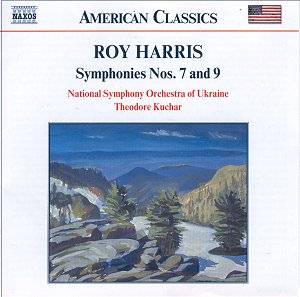Roy Harris is a visionary composer-poet who rejected the thin-lipped self-serving avant-garde having found his own melody-founded language early on.
From the very first bar of the Seventh Symphony you can tell that Kuchar and the Ukrainian orchestra have got this music to a tee. They have served a long apprenticeship in the American Classics series. Their recordings of the first three Creston symphonies and the Piston violin concertos are pillars of the catalogue for adventurous enthusiasts and collectors.
The recording here is 'in your face': belligerent and radiant with the woodwind and brass fulsomely assertive. The only niggle is that insufficient emphasis is given to the vibraphone in the Seventh that should ring out in sonorous lambency at the climax as it does in the old Ormandy CBS recording now on Albany. By contrast side drum, xylophone and other percussion are captured with Phase 4 immediacy.
The essence of Harris lies within the margins of radiance, a weighty drawl, a wondrous awe in great things and the fearful spirituality of trackless open spaces: an analogue to Whitman's 'Unknown region'. Kuchar captures the slow drawl and steadily uprooting strength of the single-movement Seventh melding it with glory in spacious undomesticated expanses.
In this Seventh there are so many highlights. One would be at 11.16 the dance of tubular bells and oboes. At 11.46 sample the real bark on the french horns. The key is the creation of majestic momentum; this Kuchar does with forward moving life-giving force. There are no looks over the shoulder - all bridges are burnt and we know the answer to Whitman's question: 'Darest thou now O soul .....?' The Seventh ends in a snappily jazzy and uproariously confident insolence. I have repeatedly returned to this performance of the work for pleasure. It is a superb piece of work and you must hear this.
While the selling point here is, without doubt, the Seventh Symphony which by the way trounces the recently released Hugh Keelin NZSO recording on Koch International there are two other substantial works on this disc. The Epilogue to Profiles in Courage - JFK is a tribute to John F Kennedy, assassinated in 1963. The work burns with slow-talking resentful passion, sorrow, anger and valour. Once again this version tops the now etiolated Louisville recording. Pre-dating the Epilogue by a year the Ninth Symphony is only a shade less magnetic that the Seventh. It is a Philadelphia commission and dates from around the time that Ormandy recorded the Seventh. The three movements carry superscriptions from the Preamble to the US Constitution and from Walt Whitman's Leaves of Grass. The last movement is further subdivided into three sections with each carrying its own motto: 1. Of life immense in passion, pulse and power, 2. Cheerful for freest action formed, 3. The Modern Man I Sing. There is little to choose between this version and the Albany CD made by Daviud Alan Miller and the ALbany SO. That recording is coupled with a suite of childhood memories and the San Francisco-linked Eight Symphony - an even more enigmatic work.
Richard Whitehouse covers the essential ground in his notes.
I hope that we do not have to wait very long for Kuchar's versions of Harris's Symphonies 3 and 6 not to mention the enigmatic last three.
Roy Harris and Kiev? Not perhaps such an incongruous pairing. Harris himself in the 1940s and 1960s rather Rawsthorne and Alan Bush had sympathetic feelings towards the then Soviet Union and his works were played there. The Fifth Symphony was specially favoured.
Utterly indispensable for the Seventh; fascinating for the other works. Harris's hymns and paeans to brave endeavour, vitality, the sunrise and the rolling horizons lack nothing of their original vigour and muscular glory.
Rob Barnett


